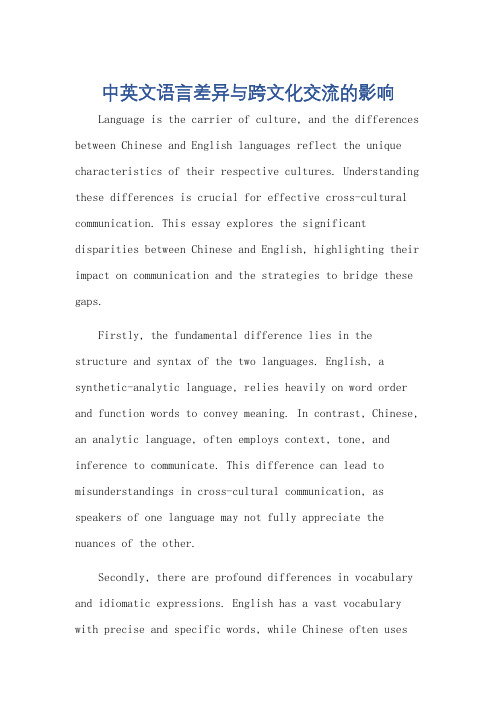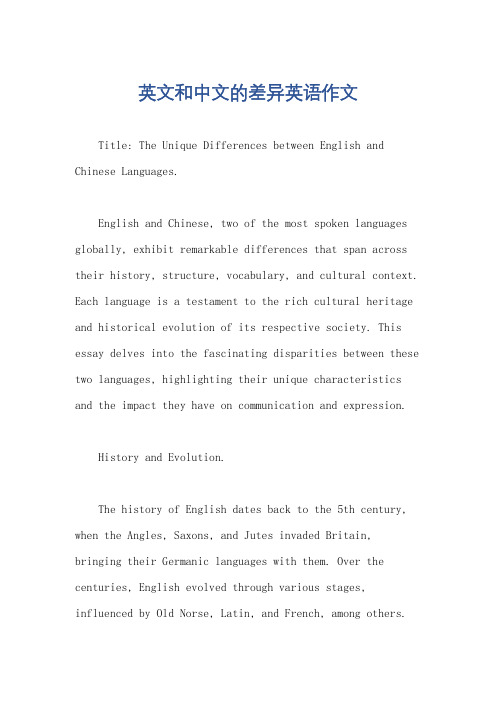中英文写作差异共27页
中英文语言差异英语作文

中英文语言差异与跨文化交流的影响Language is the carrier of culture, and the differences between Chinese and English languages reflect the unique characteristics of their respective cultures. Understanding these differences is crucial for effective cross-cultural communication. This essay explores the significant disparities between Chinese and English, highlighting their impact on communication and the strategies to bridge these gaps.Firstly, the fundamental difference lies in the structure and syntax of the two languages. English, a synthetic-analytic language, relies heavily on word order and function words to convey meaning. In contrast, Chinese, an analytic language, often employs context, tone, and inference to communicate. This difference can lead to misunderstandings in cross-cultural communication, as speakers of one language may not fully appreciate the nuances of the other.Secondly, there are profound differences in vocabulary and idiomatic expressions. English has a vast vocabulary with precise and specific words, while Chinese often usesmore general terms with rich contextual meanings. Idioms and phrasal verbs in English can be particularly challenging for non-native speakers to understand, as they often carry cultural connotations. Similarly, Chinese proverbs and allegorical expressions can be opaque to English speakers unfamiliar with Chinese culture.Furthermore, the differences in pragmatics and discourse patterns between Chinese and English can affect communication. Chinese culture tends to value indirectness and collectivism, preferring to convey messages implicitly and emphasizing group harmony. In contrast, English culture often favors directness and individualism, preferring explicit communication and highlighting personal opinions. These differences can lead to misinterpretations and communication breakdowns in cross-cultural settings.To overcome these challenges, it is essential to cultivate cultural awareness and sensitivity. Learning a language involves more than just grammar and vocabulary; it also requires understanding the cultural context and norms that underlie the language. Through exposure to diverse cultural materials, such as literature, films, and music,language learners can develop a deeper understanding of the cultural subtleties of the target language.Additionally, the use of technology and modern communication tools can aid in bridging the language gap. Machine translation and language learning apps have become increasingly popular, enabling individuals to access information and communicate across languages more easily. However, it is important to note that these tools are not perfect and should be used with caution, as they may not always capture the nuances and cultural implications of language.In conclusion, the differences between Chinese and English languages reflect the unique characteristics of their respective cultures. Understanding these differences and developing cultural awareness are crucial for effective cross-cultural communication. By bridging the language gap and fostering mutual understanding, we can enhance cross-cultural interactions and promote global connectivity.**中英文语言差异与跨文化交流的影响**语言是文化的载体,中英文之间的差异体现了各自文化的独特特征。
《中英文写作差异》课件

Summary words: Differences in vocabulary selection
Detailed description: There are significant differences in vocabulary selection between Chinese and English writing. Chinese usually uses concrete and vivid vocabulary to describe things, while English tends to use abstract and general vocabulary. In addition, there are a large number of four character idioms and fixed collocations in Chinese, which may not have a direct corresponding expression in emphasizes hierarchy and respect for elders, while English culture emphasizes equality and individual freedom This difference can be seen in Chinese writing, which often reflects the importance of hierarchy and respect for authority, while English writing tens to focus more on individual rights and freedoms
目录
CONTENTS
中英文写作的异同

life and squeeze from it the
后已。这病使她多么羡慕人家的健
last drop of happiness.It made her envy health,bt it also made her sentimental
康,也使她多愁善感,见一叶飘零,
V S 随风入室,使愁绪满怀,无以自解。
VS
汉语轻时体
英文特有的符号
(1)单引号(‘) (2)连字号(-) (3)斜线号(/) 该符号主要起分割作用,如It could be for staff and/or students.
中文特有的符号
标点符号
VS
(1)中文的句号是空心圈 (。),英文的句号是小点. (2)英文的省略号是三个点 (...),位置在行底;中文的为 六个点(.......),居于行中。 (3)英文的破折号是(-),中 文的是(—)。
英文写作:竹节句法
中文写作:流水句法
语言学家用“竹节句法“来比喻英语句 句型结构 汉语句子则被喻为“流水句法”,所谓的
子,即英语句子是由断不可缺的各种连
流水指少用乃至不用连接词仍行文流畅。
接词衔接而成,宛如节节相连的竹子。
汉语重意和,如果没有连接词,只从句子
英语重形和,英语句子如果缺少连接词
本身的意思就可以把概念关系表达清楚。
V
S
中文写作强调婉转、含蓄的表达。 曲线思维:在表达思想时,从侧面说明、 阐述外围的环境,最后点出话语的信息中 心。 B. As you know, I am now a college student at H University. I am enjoying my classes very much but I have a problem and I was wondering if you could help me.
英语作文范文-英语写作中的英汉表达差异

英语作文范文英语写作中的英汉表达差异一、首先,让我们关注一下英美人与中国人思维方式的不同。
英美人的思维方式是直线式的,他们在遣词造句谋篇上遵循着从一般(general)到具体(specific),从概括(summarize)到举例(exemplify),从整体(whole)到个体(respective)的原则。
请看短文:Soccer is a difficult sport.(1)A player must be able to run steadily without rest.(2)Sometimes a player must hit the ball with his or her head.(3)Players must be willing to bang into and be banged into by others.(4) They must put up with aching feet and sore muscles.上面的这则短文中,主题句(main idea sentence)也就是文章的中心是第一句,(1)(2)(3)(4)句是用来说明主题句的。
而在汉语中,我们习惯于先分后总,先说原因后说结果,即所谓的“前因后果”,如果要表达相同的意思,我们通常这样说:足球运动员必须能不停地奔跑,有时得用头顶球,撞别人或被别人撞,必须忍受双脚和肌肉的疼痛,所以说,足球运动是一项难度大的运动。
再比如写下面一则便条,因你母亲突然生病,周末你不能和汤姆去跳舞了,你找了舞跳得很好的时黛来代替你,并表示抱歉。
此英语便条为:July 6,2002Dear Tom,I am sorry to inform you that I won’t be able to go to dance with you this weekend. My mother is suddenly takenill.In order not to disappoint you,I have asked Shi Dai to take my place.She is a better dancer,I think.My regrets.Joe从便条中可以看出,英语表达先“果”—I won’t be able to go to dance with you this weekend后“因”—my mother is suddenly taken ill,即所谓的“先果后因”。
英语作文范文-英语写作中英汉表达差异

英语作文范文英语写作中英汉表达差异英汉表达差异中国人与西方人看问题方法在许多方面存在着差异,而且这种差异确确在束缚着中国学生,成为他们英文写作中拦路虎,使他们不能畅所欲言,不能准确而简洁地表达思想。
因此,本文就大学英语写作中常出现问题谈谈英汉表达几种差异。
思维方式的差异一、首先,让我们关注一下英美人与中国人思维方式不同。
英美人思维方式是直线式,他们在遣词造句谋篇上遵循着从一般(general)到具体(specific),从概括(summarize)到举例(exemplify),从整体(whole)到个体(respective)原则。
请看短文:Soccer is a difficult sport.(1)A player must be able to run steadily without rest.(2)Sometimes a player must hit the ball with his or her head.(3)Players must be willing to bang into and be banged into by others.(4)They must put up with aching feet and sore muscles.上面这则短文中,主题句(main idea sentence)也就是文章中心是第一句,(1)(2)(3)(4)句是用来说明主题句。
而在汉语中,我们习惯于先分后总,先说原因后说结果,即所谓“前因后果”,如果要表达相同意思,我们通常这样说:足球运动员必须能不停地奔跑,有时得用头顶球,撞别人或被别人撞,必须忍受双脚和肌肉疼痛,所以说,足球运动是一项难度大运动。
再比如写下面一则便条,因你母亲突然生病,周末你不能和汤姆去跳舞了,你找了舞跳得很好时黛来代替你,并表示抱歉。
此英语便条为:July 6,2002Dear Tom,I am sorry to inform you that I won’t be able to go to dance with you this weekend. My mother is suddenly taken ill. In order not to disappoint you, I have asked Shi Dai to take my place. She is a better dancer, I think. My regrets.Joe从便条中可以看出,英语表达先“果”—I won’t be able to go to dance with you this weekend后“因”—my mother is suddenly taken ill,即所“先果后因”。
英语和中文的差异英语作文

英语和中文的差异英语作文English:One major difference between English and Chinese is the word order. In English, the basic word order is subject-verb-object (SVO), such as "I love you". However, in Chinese, the basic word order is subject-object-verb (SOV), such as "我爱你" (I love you). Another difference is the use of articles. English has definite (the) and indefinite (a/an) articles, while Chinese does not use articles at all. Additionally, English has a larger vocabulary compared to Chinese, with a more complex system of verb tenses. Chinese, on the other hand, relies heavily on context and tone to convey meaning. Furthermore, Chinese characters are logographic, where each character represents a word or a morpheme, while English uses an alphabet-based system. These differences make learning both languages challenging but rewarding in their own ways.中文翻译:英语和中文之间的一个主要区别是词序。
汉语与英文两种语言之间的差异的英文作文

汉语与英文两种语言之间的差异的英文作文Differences Between Chinese and EnglishLanguages are a fundamental aspect of human communication and culture. Chinese and English are two of the most widely spoken languages in the world, but they differ significantly in terms of grammar, vocabulary, and pronunciation. Understanding these differences can help us appreciate the unique characteristics of each language and improve our ability to communicate effectively.One of the most striking differences between Chinese and English is the structure of the languages. Chinese is a tonal language, meaning that the pitch or intonation of a word can change its meaning. There are four tones in Mandarin Chinese, each of which conveys a different meaning. For example, the word "ma" can mean mother, hemp, horse, or scold, depending on the tone used. In contrast, English is a non-tonal language, where word meaning is primarily determined by word order, context, and stress. This fundamental difference in structure can make learning Chinese challenging for English speakers and vice versa.Another key difference between Chinese and English is the writing system. Chinese characters are logograms, which means that each character represents a word or a morpheme. There are thousands of characters in the Chinese writing system, each with its own unique meaning and pronunciation. In contrast, English uses an alphabet with 26 letters to represent sounds. While the English alphabet is relatively simple to learn, mastering Chinese characters can be a lifelong endeavor.Vocabulary is another area where Chinese and English differ. Chinese vocabulary is largely monosyllabic, meaning that most words are made up of a single syllable. English, on the other hand, has a mix of monosyllabic and polysyllabic words. Chinese also relies heavily on idiomatic expressions and set phrases, which can pose difficulties for English speakers trying to learn the language. Additionally, Chinese has a rich collection of homophones, words that sound alike but have different meanings, which can lead to confusion for language learners.Pronunciation is another area where Chinese and English diverge. Chinese has a limited number of syllables, and many sounds are distinct and easily distinguishable. English, on the other hand, has a wide range of vowel and consonant sounds, making it a more challenging language to pronounce accurately.English also has a complex system of stress and intonation, which can greatly affect the meaning of a sentence. Chinese speakers may struggle with the pronunciation of English sounds such as the th sound, while English speakers may have difficulty with the tones of Mandarin Chinese.Despite these differences, Chinese and English also share some similarities. Both languages have a rich literary tradition and a long history of written literature. Both languages also have a diverse range of dialects and regional variations, which can make communication between speakers of different dialects challenging. In today's globalized world, it is increasingly important to be able to communicate across linguistic and cultural boundaries, and understanding the differences between Chinese and English can help facilitate this communication.In conclusion, Chinese and English are two of the most widely spoken languages in the world, but they differ significantly in terms of grammar, vocabulary, and pronunciation. Understanding these differences can help us appreciate the unique characteristics of each language and improve our ability to communicate effectively. While learning a new language can be challenging, it can also be a rewarding experience that opensup new opportunities for cross-cultural communication and understanding.。
英文和中文的差异英语作文

英文和中文的差异英语作文Title: The Unique Differences between English and Chinese Languages.English and Chinese, two of the most spoken languages globally, exhibit remarkable differences that span across their history, structure, vocabulary, and cultural context. Each language is a testament to the rich cultural heritage and historical evolution of its respective society. This essay delves into the fascinating disparities between these two languages, highlighting their unique characteristics and the impact they have on communication and expression.History and Evolution.The history of English dates back to the 5th century, when the Angles, Saxons, and Jutes invaded Britain, bringing their Germanic languages with them. Over the centuries, English evolved through various stages, influenced by Old Norse, Latin, and French, among others.Conversely, Chinese, with a history spanning over 4,000 years, is believed to have originated from the scripts of the Shang Dynasty. Chinese script, known as Hanzi, has remained relatively unchanged through the years, retaining its original logographic form.Structural Differences.English is a language that follows the Subject-Verb-Object (SVO) structure, where the subject performs the action denoted by the verb on the Object. This structure forms the backbone of English sentences, governing the order of words and phrases. Chinese, however, exhibits a more flexible structure, often following the Subject-Verb (SV) pattern, with the Object appearing before the Verb. This allows for a more free-flowing sentence structure, where words and phrases can be rearranged without altering the meaning.Vocabulary Divergence.The vocabulary of English and Chinese differssignificantly in terms of origin, meaning, and usage. English, being a Germanic language, has borrowed words from various languages, resulting in a rich lexicon with words from Latin, French, Greek, and even Arabic. Chinese, on the other hand, boasts a vast vocabulary derived from its own historical and cultural context. Hanzi, the written form of Chinese, consists of ideograms that represent concepts or ideas, often incorporating elements of nature, mythology, or daily life.Cultural Context.The cultural context of English and Chinese isreflected in their respective languages. English, being the language of global communication, often carries a neutral or universal tone, allowing for a more objective and analytical approach to communication. Chinese, on the other hand, is deeply rooted in its cultural heritage, reflecting values such as harmony, respect, and collectivism. This cultural influence is evident in the way Chinese is spoken and written, with an emphasis on context and implied meanings.Conclusion.In conclusion, the differences between English and Chinese languages are vast and diverse, reflecting the unique historical, cultural, and structural backgrounds of each. English, with its global reach and analytical precision, has become the lingua franca of the world. Chinese, with its deep cultural roots and flexible language structure, remains a powerful testament to the rich heritage of the East. Understanding these differences is crucial in bridging cultural gaps and promoting effective communication across borders.。
